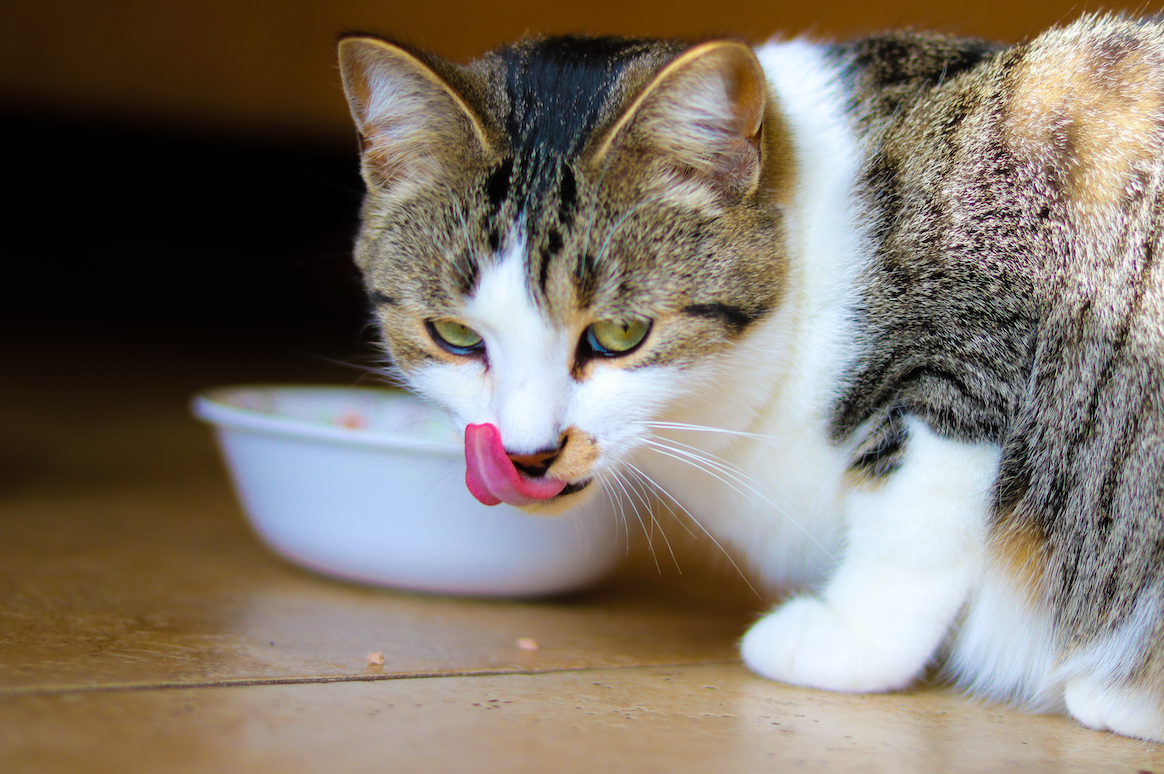Solving the mystery of cat food allergies
June 9, 2021

Published: June 2021 | Updated: April 2023
The term "food allergy" refers to an abnormal immune response to an antigen found in food. Basically, a food allergy is an immune system reaction (an allergic reaction) to a specific protein found in cat food.
To develop a food allergy, the food must be one the cat has previously been exposed to. A cat cannot develop a food allergy if she has never been exposed to it.
Beef, fish, chicken, and dairy products are the culprits associated with the most common cat food allergies. There has been little research done in this area, and there may be other common allergens that we haven't discovered yet. So, if you have tried eliminating these products and your cat is still experiencing a reaction, there is a possibility it could still have something to do with their diet.
Typical Cat Food Allergy Symptoms
Itching and skin inflammation are common in cats with food-related allergies. The face, ears, belly, groin, armpits, and legs/paws are commonly affected by itching, redness, and inflammation. You will likely notice cats with these symptoms grooming themselves excessively, resulting in more trauma to their skin (hot spots, loss of fur in areas and even “cat food allergy scabs”).
Recurrent skin and ear infections are also possible in cats experiencing food allergies. For some cats, chronic skin and ear infections could be the only symptom. The severity of symptoms vary on a case-by-case basis.
In addition to their skin problems, cats with food allergies may experience gastrointestinal symptoms such as vomiting or diarrhea. Cats may also experience frequent bowel movements or strain when they attempt to defecate.
Diagnosing and Treating Food Allergies in Cats
Food allergies can cause chronic itching, but other conditions such as mites, bacterial infection, yeast infection, or other allergies can also cause similar symptoms. As a result, testing is necessary to determine the cause of your cat's skin problem. Your veterinarian will likely rule out everything but allergies to begin with to ensure your cat’s well-being.
Once everything else has been ruled out (mites, infection, etc), your veterinarian will likely move onto attempting to diagnose allergies. This is difficult to do and entails quite a lengthy process. But, it’s well worth the process to get your cat feeling better to improve her quality of life.
A food trial is the most reliable test for diagnosing food allergies. This test involves feeding a special diet for 6-8 weeks that does not contain any proteins that your cat has previously been exposed to. A food trial diet can take a variety of forms, including:
-
A Hydrolyzed-Protein Diet: Proteins are broken down into a size too small for the immune system to recognize.
-
Commercial Protein Diet: A commercial diet that contains none of the ingredients your cat was previously eating.
- Home-Cooked Protein Diet: To ensure none of the ingredients your cat has previously been exposed to are involved. In a commercial diet, we can see the ingredients list but we aren’t certain what’s in it. In a home-cooked diet, your veterinarian and cat lover both know exactly what’s in the food.
Your veterinarian will advise you on the best course of action for your unique cat’s needs.
During the food trial, your cat must only eat the food that your veterinarian has recommended. It's critical that no other treats, supplements, or edible products are given during the food trial.
After your family meals, be sure to clean up the dishes off the table, because even licking a plate clean can tamper with the results. Be certain to only provide what your veterinarian has recommended. Anything else that is consumed can provide incorrect results and may require a trial to be completely restarted.
The next step is to perform a food challenge if your cat's allergy symptoms improve while on the food trial. It's time to reintroduce your cat's old food. Some veterinarians will perform the food challenge, whereas others may not be willing to take the risk. It depends upon the severity of your cat's food allergy.
If the signs of food allergies in cats go away after the diet trial, and return after the food challenge, your cat has been definitively diagnosed with a food allergy.
Probiotics May Assist With Preventing Cat Food Allergies
Although food intolerance is more closely linked to digestion than food allergies, there is still a link between the cat digestive system and allergies. If your cat's digestive tract isn't in good shape, this can cause problems as well.
Probiotics should be included in your cat's daily routine to ensure that her food is properly digested and her GI tract is working to its full potential.
Your cat's gastrointestinal system requires "healthy" bacteria for proper food digestion and nutrient release. By warding off potential pathogens, good gut bacteria also protect your cat's immune system.
In your cat's system, healthy bacteria colonies keep pathogen-laden "evil" bacteria at bay. Your cat is more susceptible to a variety of illnesses, including inflammatory bowel disease, diarrhea, tooth decay, and allergies, when there is an imbalance of good and bad bacteria (a condition known as dysbiosis).
The use of a high-quality probiotic can help to maintain a healthy gut flora and gastrointestinal tract balance. Because your cat is more prone to infection as a result of his allergies, you'll want to choose a strain like Saccharomyces boulardii to ensure that the probiotics continue to work even if an antibiotic is prescribed.
The Bottom Line: How to Help Your Cat
Having a cat with food-related allergies can be extremely frustrating. It’s important to be patient in these cases. If you suspect allergies in your cat, make an appointment with your veterinarian to have her tested for underlying medical issues.
Once those are ruled out, your veterinarian may recommend you to a nutritionist, or may begin a food trial to determine what’s causing the allergic reaction. Taking the time to do the food trial is likely to dramatically improve your cat’s quality of life. Finally, adding a specialized cat probiotic in the meantime can help your cat remain on track while boosting her well-being.

